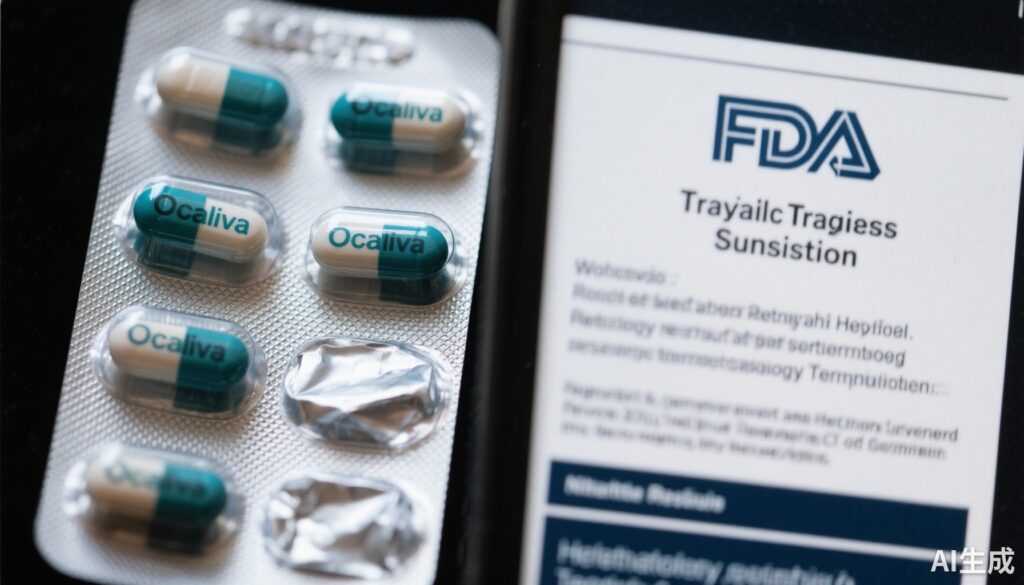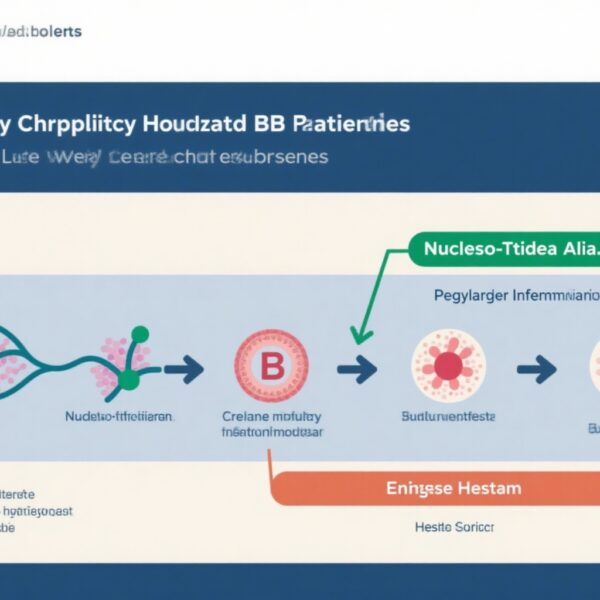Introduction
Intercept Pharmaceuticals announced on September 11, 2025, a voluntary withdrawal of OCALIVA (obeticholic acid), a drug used in the treatment of primary biliary cholangitis (PBC), from the United States market following a request from the US Food and Drug Administration (FDA). Concurrently, the FDA has suspended all ongoing clinical trials involving obeticholic acid. This follows a series of regulatory setbacks beginning with the European Commission’s revocation of the conditional marketing authorization (CMA) in 2024, and the FDA’s refusal to grant full approval to OCALIVA later that year. This article critically reviews the history, clinical evidence, regulatory challenges, and future implications of this decision in the management of PBC.
Background on Primary Biliary Cholangitis and Treatment Landscape
Primary biliary cholangitis, formerly known as primary biliary cirrhosis, is a rare, progressive autoimmune liver disease predominantly affecting women over 40 years old, with an approximate incidence rate of 1 per 10,000 individuals. It is characterized by destruction of intrahepatic bile ducts, leading to impaired bile flow, cholestasis, liver inflammation, and eventual fibrosis. Untreated, PBC often progresses to cirrhosis and liver failure.
Before the availability of OCALIVA, ursodeoxycholic acid (UDCA) was the mainstay and only approved pharmacologic therapy, significantly improving biochemical markers and survival. However, up to 50% of patients exhibit inadequate response or intolerance to UDCA, necessitating alternative treatments. The development of obeticholic acid—an agonist of the farnesoid X receptor (FXR)—represented a promising second-line therapeutic agent targeting bile acid metabolism and fibrosis pathways.
OCALIVA’s Development and Regulatory Milestones
Approved through accelerated approval by the FDA in 2016, OCALIVA was indicated for adult PBC patients with an inadequate response to or intolerance of UDCA, marking the first approved second-line option. Initial commercial uptake was modest, with sales escalating from approximately $18 million in the first year to around $310 million annually by 2020, reflecting adoption in clinical practice.
However, the drug’s benefit-risk profile was questioned soon after its introduction. By 2017, the FDA Adverse Event Reporting System (FAERS) had received multiple reports of severe liver injury and deaths potentially related to OCALIVA. In 2018, a black box warning was appended to its label, cautioning against use in patients with moderate to severe liver impairment due to risks of liver decompensation and failure.
Clinical Data and Safety Concerns
The pivotal 747-302 Phase 3 trial—the primary confirmatory study—failed to demonstrate statistically significant clinical benefit of OCALIVA in PBC patients based on key endpoints, such as reduction in alkaline phosphatase levels or progression-free survival. More concerningly, the trial data suggested an increased risk of adverse outcomes including liver transplantation and death associated with OCALIVA use.
At the FDA advisory committee meeting in 2024, expert panelists overwhelmingly opposed full approval of OCALIVA. Agency briefing documents emphasized substantial uncertainty regarding both efficacy and safety, noting the drug’s inconclusive benefit and clear risks. These findings underscored the challenge of validating surrogate endpoints used during initial accelerated approval and the limits of clinical trial data to support safe widespread use.
In accordance with accelerated approval regulations, the company was expected to withdraw the drug from the market given unconfirmed clinical benefit and emerging safety signals. Nonetheless, Intercept continued efforts to produce supplementary data, delaying withdrawal but facing increasing regulatory pressure as policies tightened around drug approvals.
Global Regulatory Actions and Market Withdrawal
Following the European Commission’s CMA withdrawal in 2024 and the FDA’s refusal of full approval, the voluntary US market withdrawal in September 2025 marked the endpoint of OCALIVA’s regulatory journey. Simultaneously, all clinical trials involving OCALIVA were put on hold by the FDA to reassess safety profiles.
In China, the original formulation of OCALIVA has not been approved; however, multiple domestic pharmaceutical companies have sought approval for generic versions. While several clinical trials were underway or completed, regulatory responses began reflecting global regulatory skepticism. For instance, the National Medical Products Administration (NMPA) accepted some listing applications but rejected others—such as the refusal of a recent application by Zhengda Tianqing—potentially influenced by the drug’s international withdrawal.
Implications for Clinical Practice and Research
OCALIVA’s withdrawal leaves a significant therapeutic gap in managing patients with UDCA-refractory PBC. Despite safety concerns, this subgroup remains underserved clinically. This void creates opportunities for emerging therapies such as Gilead Sciences’ LIVTENCITY (obeticholic acid successor or other novel agents) to gain traction.
Moreover, the OCALIVA case exemplifies challenges in accelerated approval pathways, emphasizing the need for rigorous post-approval confirmatory trials and realistic surrogate endpoint assessment. It also highlights the importance of pharmacovigilance in detecting serious adverse events early to guide regulatory decisions.
For pharmaceutical companies developing generics or novel FXR agonists, strategic recalibration is required to address safety concerns and regulatory expectations, especially in stringent regulatory environments.
Conclusion
After nearly a decade on the market, OCALIVA’s withdrawal due to unresolved safety risks and lack of robust efficacy evidence underscores the complexities of drug development in rare, progressive diseases like PBC. Clinicians must remain vigilant about the evolving therapeutic landscape and adhere to evidence-based protocols while awaiting safer and more effective options. Regulatory agencies’ increasingly cautious stance on accelerated approvals serves as a reminder that patient safety and demonstrable benefit remain paramount.
Continued research into alternative PBC treatments, alongside careful monitoring of existing therapies, is essential to improve outcomes in this challenging patient population.
References
1. Hirschfield GM, et al. “Obeticholic acid for primary biliary cholangitis.” N Engl J Med. 2015;373(19):1781–1789.
2. US Food and Drug Administration. Ocaliva Label – Black Box Warning. FDA.gov. 2018.
3. Intercept Pharmaceuticals, Inc. 2024. FDA Advisory Committee Briefing Document for Ocaliva.
4. European Medicines Agency. Withdrawal of Ocaliva conditional marketing authorization. 2024.
5. Mayo MJ, et al. “Safety concerns and liver-related adverse events with obeticholic acid.” Hepatology. 2019;70(3):1230–1237.
6. National Medical Products Administration (NMPA), China. Public notice on drug approvals.



